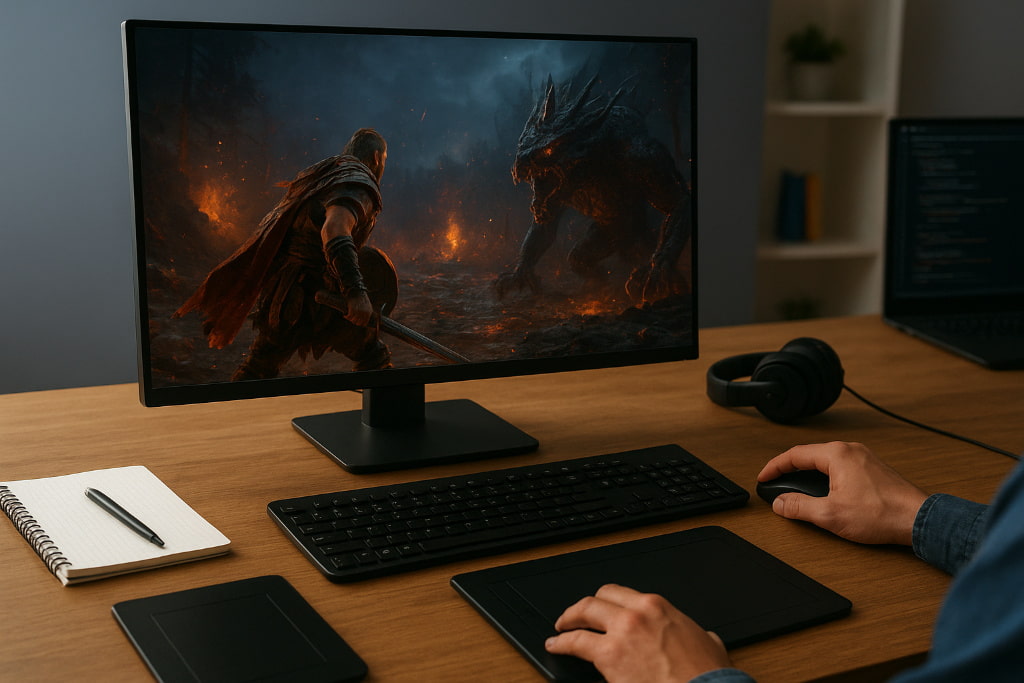Game development has become one of the most exciting fields in technology today. Whether you are an aspiring indie developer or a professional looking to polish your skills, having the right tools can make the process smoother and more efficient. With the variety of software available, it can feel overwhelming to choose the right ones. This blog will guide you through the essential tools and software for game development that can help bring your creative ideas to life.
1. Game Engines
A game engine is the backbone of game development. It provides the structure and features needed to build games without starting everything from scratch.
- Unity:
One of the most popular engines, Unity is known for being beginner-friendly and versatile. It supports both 2D and 3D games, has a massive asset store, and allows developers to publish games on multiple platforms such as PC, Android, iOS, and even consoles.
- Unreal Engine:
Famous for its stunning graphics and realistic physics, Unreal is widely used in AAA games. It uses the powerful Blueprints visual scripting system, which is great for beginners who don’t know coding.
- Godot:
An open-source game engine gaining popularity, Godot is lightweight and perfect for indie developers. It supports both 2D and 3D game development and has its own scripting language (GDScript).
Choosing the right game engine depends on your goals—Unity for versatility, Unreal for high-end visuals, and Godot for open-source freedom.
2. Graphic Design and Animation Tools
A game is incomplete without engaging graphics, characters, and animations. These tools help you design stunning visuals.
- Blender:
A free and open-source 3D modeling software, Blender is a favorite among game developers. It can be used for character modeling, animation, rigging, and even creating realistic environments.
- Adobe Photoshop:
Ideal for designing textures, backgrounds, and user interfaces. Photoshop is widely used for creating 2D game assets.
- Adobe Illustrator:
Perfect for vector-based artwork, icons, and scalable game graphics.
- Spine:
A specialized tool for 2D skeletal animation that makes character movements smooth and natural.
3. Sound and Music Tools
Sound effects and background music play a crucial role in enhancing the gaming experience. The following tools are essential for game audio:
- Audacity:
A free and open-source audio editing software. Great for recording, editing, and mixing sounds.
- FL Studio:
A powerful tool for creating music tracks and sound effects that can be used in games.
- FMOD & Wwise:
Advanced audio middleware used in professional game development to manage dynamic and interactive sound.
4. Coding and Scripting Tools
Even if you use a visual scripting system, understanding and writing code is often required.
- Visual Studio:
Commonly used with Unity, Visual Studio is a powerful code editor with debugging features.
- Rider by JetBrains:
An alternative to Visual Studio, Rider is highly optimized for Unity and C#.
- Notepad++:
Lightweight and simple, great for writing and editing scripts quickly.
5. Project Management Tools
Game development is often a team effort, and keeping track of tasks is important.
- Trello:
A simple project management tool where you can organize tasks using boards and cards.
- Jira:
Used by professional studios, Jira helps in managing complex projects and tracking progress effectively.
- Slack or Discord:
Communication tools for team collaboration, sharing files, and discussions in real time.
6. Version Control Tools
When working on large projects or with a team, version control ensures that changes are tracked properly.
- GitHub:
A widely used platform for storing and sharing code, allowing multiple developers to collaborate.
- GitLab & Bitbucket:
Alternatives to GitHub with additional features for private repositories and CI/CD pipelines.
7. Testing and Debugging Tools
Before releasing a game, testing is essential to ensure smooth performance.
- Sentry:
Helps in monitoring and tracking errors in real time.
- TestFairy:
Allows developers to test mobile games on real devices and gather feedback.
- GameAnalytics:
Provides insights into player behavior, helping developers improve the game experience.
Final Thoughts
Game development is not just about coding—it’s a combination of creativity, design, sound, and testing. By using the essential tools and software for game development mentioned above, you can streamline your process and focus on what matters most: building fun and engaging games.
Whether you are working solo or in a team, the right set of tools can make all the difference between a frustrating experience and a successful game launch. Start small, experiment with free software like Unity, Blender, and Audacity, and then scale up to professional tools as your skills grow.
At Atina Technology, we specialize in game development services, helping businesses and individuals turn their ideas into reality. From concept design to coding, graphics, and testing, our expert team ensures your game is built with creativity and performance in mind. If you are looking for a trusted partner to develop your game, Atina Technology is here to help.


